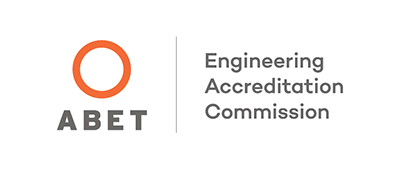- Home |
- Accreditation
Accreditation
The B.S. program in Civil Engineering is accredited by the Engineering Accreditation Commission of ABET, https://www.abet.org, under the General Criteria and Program Criteria for Civil and similarly named engineering programs.

In the United States, accreditation is a non-governmental, peer-review process that assures the quality of the postsecondary education students receive. Educational institutions or programs volunteer to undergo this review periodically to determine if certain criteria are being met. However, accreditation is not intended or used as a ranking system. Rather, it provides simply assurance that a program or institution meets established quality standards.
ABET, Inc., (www.abet.org) is responsible for the specialized accreditation of educational programs in the fields of applied science, computing, engineering, and technology. (More general information about accreditation is available at www.chea.org.) ABET accredits postsecondary degree-granting programs housed within regionally accredited institutions.
ABET accreditation is assurance that a college or university program meets the quality standards established by the profession for which it prepares its students. For example, an accredited engineering program must meet the quality standards set by the engineering profession.
ABET accredits programs only, not degrees, departments, colleges, or institutions. All programs seeking accreditation from the Engineering Accreditation Commission (EAC) of ABET must:
Demonstrate that they satisfy all General Criteria established by EAC, Demonstrate that they satisfy all specific Program Criteria established by EAC in collaboration with the lead professional society associated with the program area (for Civil engineering, this is the American Society of Civil Engineers, ASCE), Establish Program Educational Objectives that are consistent with the mission of the institution, the needs of the program’s various constituencies (employers, alumni, etc.) and EAC criteria, and Establish specific Student Outcomes that consistently support the program educational objections.
These program educational objectives establish professional career abilities and accomplishments expected for the program’s graduates within a few years following graduation. In contrast, the Student Outcomes represent are skills and abilities obtained and demonstrated by the student during their academic career and represent the body of knowledge they have obtained by the time they graduate.
At Mississippi State University, the program leading to the Bachelor of Science in Civil Engineering is accredited by the Engineering Accreditation Commission of ABET, www.abet.org. The Program Educational Objectives and the Student Outcomes for this program are presented below.
Program Mission
The mission of the Richard A. Rula School of Civil and Environmental Engineering is to proactively utilize teaching, research, and service to educate baccalaureate, masters, and doctoral students so they can become competent, dynamic, and ethical engineers.
To complement the classroom experience, our students are encouraged to reinforce instruction by participating in cooperative education programs, assisting faculty with research, or becoming involved in professional societies. Students are expected to develop an appreciation for life-long learning and pursue professional engineering licensure. The ultimate goal is to prepare our students to be future leaders who will positively impact their profession and society.
Furthermore, our students should become prepared to combine research and classroom experiences to solve complex inter-disciplinary problems. Our Master of Science students should develop expertise in an area of specialization within the civil engineering profession and be capable of applying their skills to resolve problems of interest in that area. Our doctoral students are expected to achieve a standard of excellence in civil engineering by advancing the body of knowledge and creating solutions, applied or basic, for today’s challenges. Our overall goal is to enable all of our students to study and innovatively solve the global sustainability challenges that they encounter.
Finally, our faculty, students, and staff will be engaged in professional organizations, campus committees, consultancy, student organizations, and continuing education. Through these service activities, our goal is to be a reliable professional resource for our institution, our alumni, and our society.
Program Educational Objectives
Graduates of the civil engineering program should, within a few years after graduation:
- Demonstrate a broad knowledge of the principles and fundamentals of civil engineering and their applications through their successful practice as professional civil engineers, their pursuit of graduate or professional degrees, or their engagement in other professional careers that involve the application of the engineering method.
- Achieve success in the multidisciplinary environment of the 21st century and demonstrate their ability to adapt to emerging and evolving technologies, social conditions, professional standards, and career opportunities by attaining leadership, managerial, administrative, supervisory, or other positions of responsibility.
- Demonstrate an understanding and appreciation of the ethical, societal and professional responsibilities of a civil engineer through professional registration and active membership in professional organizations.
- Demonstrate an appreciation for lifelong learning and for the value of continuing professional development in maintaining their professional competence through participation in graduate and continuing education activities.
Student Outcomes
During the course of study in civil engineering, the student should develop, and ultimately obtain:
- An ability to identify, formulate, and solve complex engineering problems by applying principles of engineering, science, and mathematics
- An ability to apply engineering design to produce solutions that meet specified needs with consideration of public health, safety, and welfare, as well as global, cultural, social, environmental, and economic factors
- An ability to communicate effectively with a range of audiences
- An ability to recognize ethical and professional responsibilities in engineering situations and make informed judgments, which must consider the impact of engineering solutions in global, economic, environmental, and societal contexts
- An ability to function effectively on a team whose members together provide leadership, create a collaborative environment, establish goals, plan tasks, and meet objectives
- An ability to develop and conduct appropriate experimentation, analyze and interpret data, and use engineering judgment to draw conclusions
- An ability to acquire and apply new knowledge as needed, using appropriate learning strategies.
